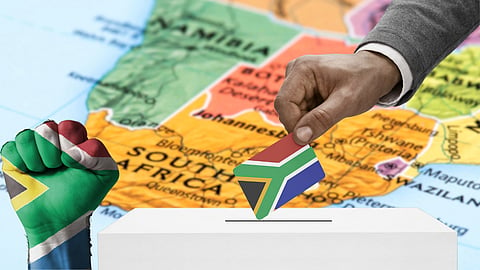From Mandela’s promise to political decay: A call for citizen action – Solly Moeng
In the wake of the ANC's initial promise, South Africa faced a downward spiral post-Mbeki, with leadership changes signalling a decline in governance. As the nation heads towards the 2024 elections, a disillusioned populace grapples with political fragmentation, economic challenges, and widespread apathy. Solly Moeng implores citizens to unite, challenging the toxic status quo and advocating for active participation in shaping a shared future, warning that continued political complacency could condemn the nation for decades.
Sign up for your early morning brew of the BizNews Insider to keep you up to speed with the content that matters. The newsletter will land in your inbox at 5:30am weekdays. Register here.
Helpless and Fearful, South Africans Retreat into Bubbles of Resilience
By Solly Moeng*
Few people will disagree that the first 14 years of ANC governance of South Africa, right up to circa 2008 when former President Mbeki was recalled due to internal party squabbles, carried much promise and hope for the country. It all started with the, arguably, wise leadership of Nelson Mandela who had a unique ability to assure all South Africans that they belonged and had a shared responsibility to build an inclusive democracy over time.
The unraveling and hell ride began just before and following Mbeki's removal from office. That is also when the once respected former liberation movement began to shed reputational credit, a process that has gotten worse over time. The ANC has never recovered its past glory, real or imagined, and it is almost certainly unlikely to do so any time soon.
Fast-forward to 2023, the promises enshrined in the founding documents of our democratic republic – especially the Constitution and Bill of rights – have repeatedly been pissed-upon in broad daylight or indefinitely deferred from any chance of realisation. More painful is the knowledge that all of the damage has been done by the men and women we trusted with the leadership of our socially fragile land, some of whom, including the current president, were there at the beginning, when the sociopolitical contracts that were negotiated came into effect.
Many in the post apartheid political elite have aided, abetted, and benefitted handsomely from all the damage that has been done to South Africa and its vital institutions of democracy, including its state owned entities (SOEs).
Today, as the country heads to the next general elections in 2024, the political space in the country is replete with an unprecedented and growing number of narratives, slogans, political offerings, the space having been further fragmented by the advent of smaller political parties and evangelical individuals, each one of whom is convinced that they will be the next big hero or heroine to pull South Africa from the edge of the precipice. Some are driven by good intentions, no doubt, but there are others who see the opportunity as "their time to eat."
The general populace, on the other hand, is increasingly uninterested, dis-empowered, confused, or fearful. There are, on one hand, those who are still unconditionally attached to their favourite political parties and politicians and, on the other hand, seemingly increasing numbers of citizens who have retreated into traditional bubbles or created new ones. The latter either feel too powerless to do anything about the toxic political status quo or fearful.
In a country with an acutely fragilised economy in which many businesses, particularly Small, Medium, and Micro Enterprises (SMMEs) have gone down due to a combination of a perennially badly managed economy – even before the arrival of Covid-19 – Covid shut-down effects, and the current, conflict-ridden, global environment – especially following the Russian invasion of and war in Ukraine – losing one's livelihood is something that is feared by many citizens.
Looking the beast straight in the eye and calling it out for what it is, or standing in the path of corrupt dealings, has also come at a huge cost to many brave whistle-blowers and others who dared to speak truth to power.
This leaves many South Africans opting out of the political system. Many observers and analysts attach the "resilient nation" label to this, but what it really is is more like someone knowing there is a deadly cancer that is fast metastasizing in their body but choosing to pretend it isn't there and to focus what is left of their energy and resources on enjoying life the best way they can.
It is a defeatist approach, of course. Only the cancer gets to benefit unhindered from it, just like only those who continue to benefit from the toxic political status quo in South Africa stand to benefit from growing levels of citizen apathy.
Just like recent steps to create multiparty packs by some opposition political parties, South African civil society movements need to rally as many citizens as possible around the task to rebuild a shared basket of things that make South Africa what it is, united in their diversity and inspired by the colourful effects of the recent Springbok Rugby World Cup glory. The future cannot be crafted by politicians alone, and celebrating major sports victories will come and go. It has to be co-crafted by active citizenry that has a clear idea about what country it wants to see emerge from the 2024 elections.
If the political status quo is allowed to continue – sadly aided by unashamedly compliant and sycophantic big business in South Africa, eager to please the criminal political network at the helm of the country in exchange for government contracts – the country will be doomed for decades to come.
Read also:
*Solly Moeng is a Brand Reputation Strategist

